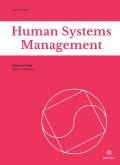Authors: Popescu, Sorin | Santa, Roxana | Teleaba, Florian | Ilesan, Hannelore
Article Type:
Research Article
Abstract:
BACKGROUND: Research is focused on companies that offshored their production and operate in the international business environment, in the current globalized world placed generically under the 4.0 index, inspired by the fourth industrial revolution. OBJECTIVE: The paper aims to draw up a structured and multilayered framework for identifying sources of risks related to the work environment and to the human resources management in this context. METHODS: An extended analysis of information in the literature and on the web is conducted to define the mentioned conceptual structure and to identify domains, processes, and actions that should be
…considered hosting such risks. First filtered by the authors based on their experience as consultants and managers in international projects, results are then validated by successive feedbacks from their peers. RESULTS: Two levels of the framework are detailed, the first correlating globalization and 4.0 development stage challenges, identifying the risk sources within a matrix detailing on one dimension technological progress, governmental & legal issues, cultural patterns, and on the other, domains sensitive to risks regarding the human resource, such as work performance, working skills, working ethics & discipline, and working models, environment & tools. The second level focuses on the sources of risks arise due to a company’s digital transformation with regard to the choice of the working models configuration, employees’ recruitment & hiring, training, working planning, organization & control, and setting up working regulations. CONCLUSIONS: The results are intended to provide support for easier and more comprehensive identification of work and human resources related risks in the mentioned context.
Show more
Keywords: Risks related to human resources, globalization 4.0, work 4.0, digital working environment risks
DOI: 10.3233/HSM-201034
Citation: Human Systems Management,
vol. 39, no. 4, pp. 511-527, 2020





